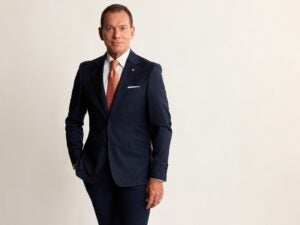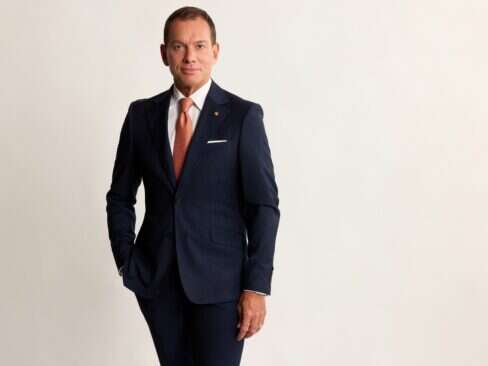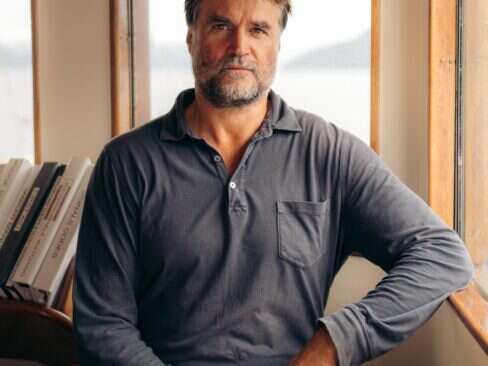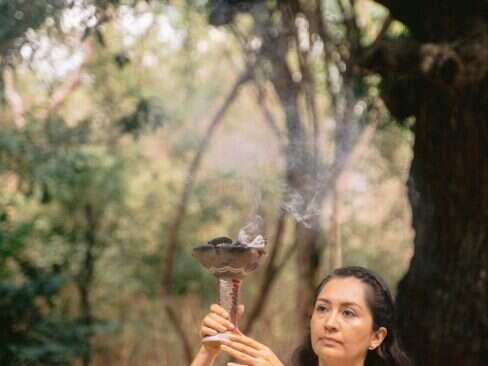Featuring contemporary Pan-African design, the shop, housed in an Art Nouveau building, has a well-curated collection of accessories that illustrate the handworked touch so integral to luxury. Vibrant jewelry, hats, knits and bags made in countries as far-flung as Cameroon and Senegal exude a fresh African aesthetic. With the growing popularity of ethically sourced and fashion forward brands like Suno and A Peace Treaty that help create job opportunities and skills growth in underdeveloped nations, ethnic goods have gone from kitschy souvenirs to mainstream luxury collectibles coveted by a discerning clientele. Rupert is leading the charge in this emerging design philosophy. Her own handbag line, Okapi, is an all-African brand. Each element of the bags—her trademark female springbok horns, the calf leather and ostrich skins sourced from sustainable farms, the labels, the lining and the packaging—is sourced and made in Southern Africa. Elite Traveler’s Editor-in-Chief Doug Gollan recently met with Rupert in to learn about how she is merging social entrepreneurship with luxury.
In 2010, South African businesswoman Hanneli Rupert opened concept store Merchants of Long to showcase the artisanal talents of Africa.
ET: You’ve launched two different businesses: Okapi and Merchants on Long. Can you give us a brief overview of each business and how they are related?
Hanneli Rupert: I started my handbag line Okapi first. The idea is that the bags are made entirely on the African continent from locally sourced materials. They are artisanal and luxurious and also have a huge job creation element as there is a focus on skills development and employment. Through investigating the local African luxury market via Okapi, I discovered several other brands doing similar things, and I decided to open an entirely African concept store on the continent, hence Merchants on Long was born in Cape Town. I stock all the top African brands, including Okapi. ET: What are your goals for each business?
Hanneli Rupert: At Merchants on Long, I would like to continue to curate the top African brands and also give some of the newer ones a platform from which to launch themselves. At Okapi, I would like to continue to grow the business and design classical and timeless heritage pieces that are not only of exceptional quality but also have a strong, authentic ethic behind them.
ET: Where did you get the idea or inspirations for Okapi and Merchants on Long?
Hanneli Rupert: At Merchants on Long, I have taken inspiration from various sources, including the designers I stock. The aesthetic is one of a very contemporary African look and feel, mixing bright colors, patterns and textures. The Okapi brand finds its roots in the era when the Okapi was first named, an era during which it was still thought to be a magical animal, “the African unicorn.” The brand encompasses elements of Art Nouveau, African mysticism and organic elements taking inspiration from nature and ritual.
ET: Can you elaborate a little bit on Okapi’s designs?
Hanneli Rupert: In designing Okapi handbags, I have been influenced by merging elements of the tribal and exotic (or the signature Springbok horn talisman found on all the bags) with the traditional refinement of the leather craftsmanship and handmade chain links. All of the bags have also been designed to be easily customizable, so that they can really become expressive of their owners. For example you can change the handles from day to evening.
ET: European luxury brands are often based on hundreds of years of history. How do you think African luxury brands should be positioned?
Hanneli Rupert: I think it would really depend on the brand. For Okapi, we place an emphasis on the quality of our manufacturing and on the millennia’s worth of natural history we take influence from.
ET: While both businesses are startups, can you tell us what your long-range plans are for them?
Hanneli Rupert: This would probably be the same as my goals…I would elaborate to say that I would like to expand my bespoke offerings at Okapi and include more collaborations with local craftsmen.
ET: In your talk at the IHT Conference, you said, “some people find problems, others find solutions.” Can you speak a bit about some of the challenges you mentioned, such as producing the goods in Africa?
Hanneli Rupert: Production in Africa can be difficult at times due to, amongst other things, the high illiteracy rates. I believe through educating people and creating jobs we can change this.
ET: In terms of business and life, do you have any role models, and why?
Hanneli Rupert: In terms of business and life both my mother and father and their parents, my grandparents, have been my role models. They have all always been incredibly ethical, kind and fair in both business and life. I feel very fortunate to have been given such a clear moral path to follow from such a young age, as it has made all of my choices much easier as a result.
ET: When you’re not working, what do you like to do?
Hanneli Rupert: I love to read and paint, and if I am in the right environment, be outdoors as much as possible.
ET: For readers who have never visited South Africa, what would be your recommended itinerary?
Hanneli Rupert: South Africa is a vast country. It would depend a lot on how much time they would have to spend and what type of trip they would like. If you would really like to connect with nature, I would recommend visiting the Karoo rather than going on a “Big 5” safari, as the landscape is far more subtle and to me more meaningful. If you want to get in as much as possible, I would recommend Cape Town, followed by Franschhoek and Hermanus, and then a two to three-day safari in the Lowveld.












